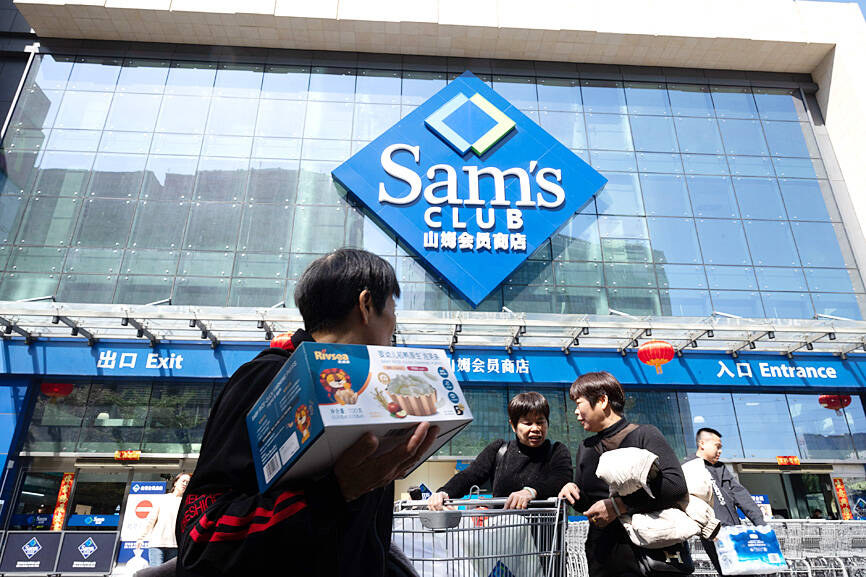Hong Kong became a ghost town during the Easter holiday as residents made a record number of trips out of town — particularly to mainland China — leaving bar strips and shopping hotspots empty.
A total of 9.3 million departures from the territory of 7.3 million people occurred last month. It was the single-highest monthly number since at least 1997, government data showed.
The exodus continued through the four-day Easter holiday that ended on Monday, when total Hong Kong resident departures for Macau and mainland China was 10 percent higher than in 2019, the data showed.

Photo: Bloomberg
This year’s Easter tourist arrivals in Hong Kong from mainland China and Macau plunged 46 percent from the 2019 period.
The great departure underscores the challenges facing the once vibrant financial center that has seen a large swath of its professional workers relocate to other countries, a diminished entertainment sector and soaring prices.
The record outflow was largely the result of people heading across the border to the mainland and Macau, where they can enjoy cheaper and a larger variety of entertainment, food and shopping.
Hong Kong residents last month made 8.3 million departures via border checkpoints — another record since at least 1997 — typically used to travel to the rest of China.
Hong Kong is increasingly losing out to nearby Chinese cities including tech hub Shenzhen and casino town Macau as a high-speed rail and a mega cross-sea bridge make cross-border travel faster and easier than ever before.
The financial center is struggling to maintain its appeal in the face of an economic slowdown and weaker yuan.
High Hong Kong rents and limited entertainment offerings — from restaurants to shopping — have pushed up prices and reduced residents’ choices.
Local bars and restaurants are struggling to stay afloat. Dining-in business over the Easter holiday was estimated to have fallen by as much as 40 percent from a year earlier, Hong Kong Federation of Restaurants and Related Trades president Simon Wong (黃家和) said on a local radio program on Monday.
A Facebook group about Hong Kong stores shutting down has attracted 186,000 members, with users posting photographs of shuttered outlets, empty shops and going-out-of business announcements.
Even Hong Kong’s tycoon-owned supermarket chains, such as CK Hutchison Holdings Ltd’s (長江和記實業) ParknShop and Jardine Matheson Holdings Ltd’s (怡和控股) Wellcome, are facing increasing pressure as they rework strategies to provide people with more choices.
State-owned conglomerates China Resources Holdings Co (華潤集團) and Dah Chong Hong Holdings Ltd (大昌行集團) — the territory’s biggest food and fast-moving consumer goods distributors — have closed dozens of grocery stores in the past few months.
Travel agencies operating tours to the mainland, on the other hand, are experiencing booming business. Over the Easter holiday, the number of Hong Kong residents signing up for tour groups to other Chinese cities rose three-fold from a year earlier, EGL Tours Co (東瀛遊旅行社) executive director Steve Huen (禤國全) said.

Taiwan’s long-term economic competitiveness will hinge not only on national champions like Taiwan Semiconductor Manufacturing Co. (TSMC, 台積電) but also on the widespread adoption of artificial intelligence (AI) and other emerging technologies, a US-based scholar has said. At a lecture in Taipei on Tuesday, Jeffrey Ding, assistant professor of political science at the George Washington University and author of "Technology and the Rise of Great Powers," argued that historical experience shows that general-purpose technologies (GPTs) — such as electricity, computers and now AI — shape long-term economic advantages through their diffusion across the broader economy. "What really matters is not who pioneers

In a high-security Shenzhen laboratory, Chinese scientists have built what Washington has spent years trying to prevent: a prototype of a machine capable of producing the cutting-edge semiconductor chips that power artificial intelligence (AI), smartphones and weapons central to Western military dominance, Reuters has learned. Completed early this year and undergoing testing, the prototype fills nearly an entire factory floor. It was built by a team of former engineers from Dutch semiconductor giant ASML who reverse-engineered the company’s extreme ultraviolet lithography (EUV) machines, according to two people with knowledge of the project. EUV machines sit at the heart of a technological Cold

TAIWAN VALUE CHAIN: Foxtron is to fully own Luxgen following the transaction and it plans to launch a new electric model, the Foxtron Bria, in Taiwan next year Yulon Motor Co (裕隆汽車) yesterday said that its board of directors approved the disposal of its electric vehicle (EV) unit, Luxgen Motor Co (納智捷汽車), to Foxtron Vehicle Technologies Co (鴻華先進) for NT$787.6 million (US$24.98 million). Foxtron, a half-half joint venture between Yulon affiliate Hua-Chuang Automobile Information Technical Center Co (華創車電) and Hon Hai Precision Industry Co (鴻海精密), expects to wrap up the deal in the first quarter of next year. Foxtron would fully own Luxgen following the transaction, including five car distributing companies, outlets and all employees. The deal is subject to the approval of the Fair Trade Commission, Foxtron said. “Foxtron will be

INFLATION CONSIDERATION: The BOJ governor said that it would ‘keep making appropriate decisions’ and would adjust depending on the economy and prices The Bank of Japan (BOJ) yesterday raised its benchmark interest rate to the highest in 30 years and said more increases are in the pipeline if conditions allow, in a sign of growing conviction that it can attain the stable inflation target it has pursued for more than a decade. Bank of Japan Governor Kazuo Ueda’s policy board increased the rate by 0.2 percentage points to 0.75 percent, in a unanimous decision, the bank said in a statement. The central bank cited the rising likelihood of its economic outlook being realized. The rate change was expected by all 50 economists surveyed by Bloomberg. The